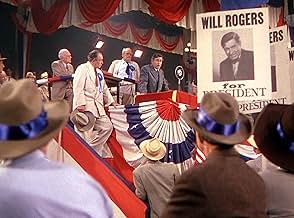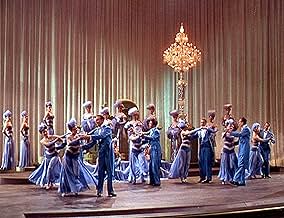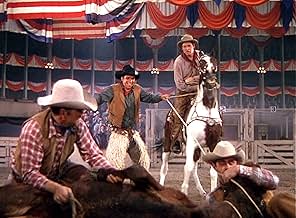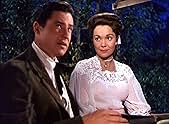Aggiungi una trama nella tua linguaThe homespun humorist and social critic starts as a cowboy and goes on to vaudeville, movies, and radio.The homespun humorist and social critic starts as a cowboy and goes on to vaudeville, movies, and radio.The homespun humorist and social critic starts as a cowboy and goes on to vaudeville, movies, and radio.
- Regia
- Sceneggiatura
- Star
Todd Karns
- 1st Mechanic
- (scene tagliate)
J. Carrol Naish
- Narrator
- (voce)
Dub Taylor
- Actor
- (scene tagliate)
Victor Adamson
- Townsman Greeting Will
- (non citato nei titoli originali)
Leon Alton
- Rodeo Spectator
- (non citato nei titoli originali)
Recensioni in evidenza
When they discuss the great movies of director Michael Curtiz, they start with Casablanca, which may well be the greatest American movie - for which he earned a well-deserved Oscar - and go on to such screen gems as The Adventures of Robin Hood, Captain Blood, The Sea Hawk, Yankee Doodle Dandy (which is a slow movie with a great performance by its star), Life with Father, and a host of others. I doubt anyone would think to mention this movie.
And The Story of Will Rogers is not a great movie. It does not move with the relentless drive of Casablanca or Robin Hood, it does not sparkle like Life with Father. Seventeen years after his untimely death in 1935, it tells the story of the then still well-remembered American humorist, Will Rogers. Since everyone still knew his story then, the movie did not have to tell it; rather, it picked the moments that it wanted to stand out.
That isn't Rogers' years in the Ziegfeld Follies, which made him a household word, or his appearance in movies, even through, for a short while, he was the biggest box office attraction in talkies.
Rather, it concentrates on Rogers' support of General William (Billy) Mitchell and his efforts to get Congress to put money into air power at a time when the U.S. was pulling back into isolationism. World War II and the terrifying German blitzkrieg would eventually show that Mitchell and Rogers were right.
It also concentrates, in the last part, on Rogers' fund raising for the poor during the depths of the Depression. That, too, is an aspect of Rogers' career that is probably forgotten today.
This movie won't keep you glued to your seat. But it does serve to remind us, now that there are few among us who remember seeing and hearing Rogers, what warm-hearted pleasure he brought to Americans when so many of us needed a smile so badly. His sense of humor may seem corny today - it was corny back then, too - but there is a lack of nastiness or derision to it that I often miss today.
And The Story of Will Rogers is not a great movie. It does not move with the relentless drive of Casablanca or Robin Hood, it does not sparkle like Life with Father. Seventeen years after his untimely death in 1935, it tells the story of the then still well-remembered American humorist, Will Rogers. Since everyone still knew his story then, the movie did not have to tell it; rather, it picked the moments that it wanted to stand out.
That isn't Rogers' years in the Ziegfeld Follies, which made him a household word, or his appearance in movies, even through, for a short while, he was the biggest box office attraction in talkies.
Rather, it concentrates on Rogers' support of General William (Billy) Mitchell and his efforts to get Congress to put money into air power at a time when the U.S. was pulling back into isolationism. World War II and the terrifying German blitzkrieg would eventually show that Mitchell and Rogers were right.
It also concentrates, in the last part, on Rogers' fund raising for the poor during the depths of the Depression. That, too, is an aspect of Rogers' career that is probably forgotten today.
This movie won't keep you glued to your seat. But it does serve to remind us, now that there are few among us who remember seeing and hearing Rogers, what warm-hearted pleasure he brought to Americans when so many of us needed a smile so badly. His sense of humor may seem corny today - it was corny back then, too - but there is a lack of nastiness or derision to it that I often miss today.
Most biopics leave a lot to be desired...especially those made during the classic era in Hollywood. Too often the actual lives of these heroes have been changed in order to make them seem more cinematic....and lying and twisting the facts is pretty much par for the course. Some films don't even have much to do with the actual person they are portraying (such as "Night and Day" and "Words and Music").
In light of this, I was shocked that for the most part "The Story of Will Rogers" is mostly the actual life and career of the man! Now I am not saying it's perfect, as for example, Will's father had died long before and the film must have assumed the man was a zombie! But apart from that and a few small items, the film IS the life of Will Rogers.
To play the man, the studio did something unusual. First, they consulted with Rogers' widow (why they actually wanted to get the facts right is beyond me!). Second, they got Rogers' son, Will Jr., to play him. Now Will Jr. Didn't look exactly like his dad (I think he actually looked more like Chill Wills), but he was pretty close and captured the man pretty well.
Why do I think they got Rogers' life right? Well, I think two reason account for this. First, Rogers DID so many amazing things that there wasn't the same need to embellish it to 'spice it up'. Second, as Rogers was such a public figure, had they NOT stuck to the facts, folks would have noticed.
So, overall it's a very good film and an excellent overview of the actor/humorist's life. Well worth seeing.
In light of this, I was shocked that for the most part "The Story of Will Rogers" is mostly the actual life and career of the man! Now I am not saying it's perfect, as for example, Will's father had died long before and the film must have assumed the man was a zombie! But apart from that and a few small items, the film IS the life of Will Rogers.
To play the man, the studio did something unusual. First, they consulted with Rogers' widow (why they actually wanted to get the facts right is beyond me!). Second, they got Rogers' son, Will Jr., to play him. Now Will Jr. Didn't look exactly like his dad (I think he actually looked more like Chill Wills), but he was pretty close and captured the man pretty well.
Why do I think they got Rogers' life right? Well, I think two reason account for this. First, Rogers DID so many amazing things that there wasn't the same need to embellish it to 'spice it up'. Second, as Rogers was such a public figure, had they NOT stuck to the facts, folks would have noticed.
So, overall it's a very good film and an excellent overview of the actor/humorist's life. Well worth seeing.
I agree with the previous commenter about how good this movie is and would love to see it available on video. This movie was made in 1952 and starred Will Rogers Jr. It showed Will Rogers Jr, as his father, doing some performance on Broadway as well as some of the fund-raisers he did during the depression and more of the movies he made in Hollywood. However this website is showing a picture of a movie made in 1961, narrated by Bob Hope, and it is NOT the same movie that they are describing. The one narrated by Bob Hope, is available on video (dvd), and although it is a good biographical movie of Will Rogers, it is NOT the one starring Will Rogers Jr, or any of the other stars listed on this web site. They need to remove that picture as it can cause some confusion for some people.
Both Michael Curtiz and his longtime employer, Warner Brothers, showed a flair for biographies, and this one has been somewhat underrated. The story is the familiar one of the rise of a young man from obscurity to worldwide fame, and there are really no surprises here. Audiences at the time the movie came out (1952) probably knew much about Rogers' life anyway, though he is nowadays an almost forgotten figure. This movie is solid entertainment, nicely photographed in color, and Will Rogers, Jr. gives an excellent, engaging performance as his father. It is basically a series of cliches, which, once once accepts the premise, one can thoroughly delight in, as I did, as the skill with which such material is handled constitutes the pleasure of watching such a predictable movie as this.
Rogers was a huge star in vaudeville on Broadway and in the movies. He was also a newspaper columnist and radio commentator, and hugely popular in his day. His homespun humor has dated badly, but the rough and tumble world he came out of is fascinating to see recreated on screen. There are nice ironies in the movie, among them, Rogers' move from the "real west" (Oklahoma) to the "false west" (Hollywood). I also like the casting of the refined, almost patrician actor, Carl Benton Reid, as Rogers' father. The arrival of barnstorming aviator who lands literally in Rogers' backyard, is stunningly filmed, and one can't help get a lump in one's throat as soon as one learns his name: Wiley Post.
Rogers was a huge star in vaudeville on Broadway and in the movies. He was also a newspaper columnist and radio commentator, and hugely popular in his day. His homespun humor has dated badly, but the rough and tumble world he came out of is fascinating to see recreated on screen. There are nice ironies in the movie, among them, Rogers' move from the "real west" (Oklahoma) to the "false west" (Hollywood). I also like the casting of the refined, almost patrician actor, Carl Benton Reid, as Rogers' father. The arrival of barnstorming aviator who lands literally in Rogers' backyard, is stunningly filmed, and one can't help get a lump in one's throat as soon as one learns his name: Wiley Post.
This one is now out on DVD in the Warner Archives Collection. I saw this picture when it first came out - I was 11 at the time and I wanted to see if it held up in the ensuing 58 years, and I'm pleased to report it is just as entertaining and absorbing the second time around.
Such is not always the case. I did the same thing with "The High And The Mighty", and was disappointed at how trite and stagey the picture seemed when I saw it recently. But "Will Rogers" holds up, probably because it is a biography of a very famous American from the early part of the last century. Then as now, I was fascinated by what a dead ringer for his dad Will Rogers, Jr. was. I also think the movie benefited from a superior direction job.
Can I make one criticism? I didn't think Jane Wyman fit the part of a girlfriend/ wife from Oologah, Okla. She was too sophisticated, like a society chick from Riverside Drive who wouldn't bother with a bumpkin from Oologah. But that's just me.
In any case, this is worth buying and watching. I don't think it will be on TV any time soon as there are two scenes of Eddie Cantor and Al Jolson performing in blackface. Can't upset the PC crowd, you know.
Such is not always the case. I did the same thing with "The High And The Mighty", and was disappointed at how trite and stagey the picture seemed when I saw it recently. But "Will Rogers" holds up, probably because it is a biography of a very famous American from the early part of the last century. Then as now, I was fascinated by what a dead ringer for his dad Will Rogers, Jr. was. I also think the movie benefited from a superior direction job.
Can I make one criticism? I didn't think Jane Wyman fit the part of a girlfriend/ wife from Oologah, Okla. She was too sophisticated, like a society chick from Riverside Drive who wouldn't bother with a bumpkin from Oologah. But that's just me.
In any case, this is worth buying and watching. I don't think it will be on TV any time soon as there are two scenes of Eddie Cantor and Al Jolson performing in blackface. Can't upset the PC crowd, you know.
Lo sapevi?
- QuizThe real Eddie Cantor appears as himself in support of Will Rogers, Jr. who portrays his father, a contemporary of Cantor's. The next year Rogers, Jr. would return the favor, again appearing as his father in The Eddie Cantor Story. Both films were made by Warner Brothers.
- BlooperWhen Will Rogers is addressing the bankers at 1:17:00 in, there are 2 old style microphones on the table in front of him. The one on the left of the screen, Rogers' right, is missing one of the suspension springs between the mic cartridge and the frame. It also has no wire attached to it, so it couldn't possibly function.
- Citazioni
Will Rogers: Well it looks like the women are finally gonna get the vote. A lot of men say they shouldn't be trusted with it. Seems kind of silly to stop trustin' them now after eatin' their cookin' for 4000 years.
- ConnessioniEdited from Rapsodia in blu (1945)
- Colonne sonoreHome on the Range
(uncredited)
Music by Daniel E. Kelley
Lyrics by Brewster M. Higley
Played at the beginning and during the opening credits
Sung at the Rogers party and used often in the score
I più visti
Accedi per valutare e creare un elenco di titoli salvati per ottenere consigli personalizzati
Dettagli
- Data di uscita
- Paese di origine
- Lingua
- Celebre anche come
- Historia Willa Rogersa
- Luoghi delle riprese
- Azienda produttrice
- Vedi altri crediti dell’azienda su IMDbPro
- Tempo di esecuzione
- 1h 49min(109 min)
- Proporzioni
- 1.37 : 1
Contribuisci a questa pagina
Suggerisci una modifica o aggiungi i contenuti mancanti




































